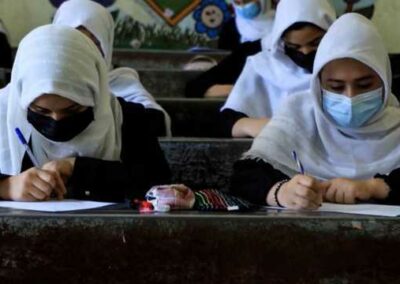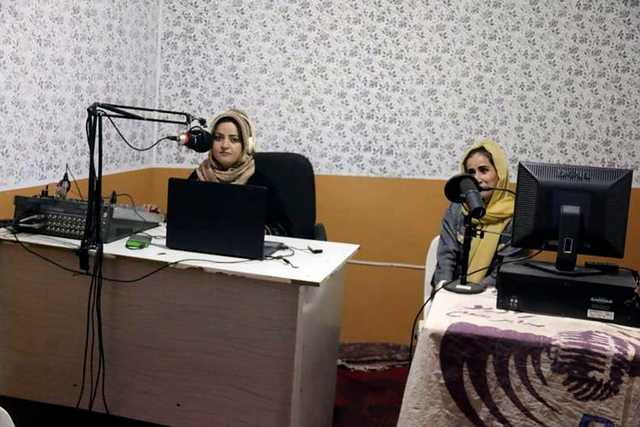The Taliban government in Afghanistan has ban University education for females with immediate effect. Afghanistan’s ministry for higher education sent a letter to all Universities, notifying them of the cabinet’s decision to suspend University education for women and girls in the country.
“You all are informed to immediately implement the mentioned order of suspending the education of females until further notice,” a letter signed by Neda Mohammad Nadeem, the country’s minister for Higher Education, reads.
As of Wednesday morning, armed guards were seen standing at the gates of Universities, preventing female students from entering campuses and University premises. Many, including lecturers and students, criticised the Taliban’s decision, describing it as an assault on human rights.
“My female students are distraught, and I don’t know how to console them,” one lecturer, who spoke on the condition of anonymity, told TheGuardian. “One of them moved to Kabul from a remote province, overcoming so many hardships, because she got into a prestigious university here. All her hopes and dreams were crushed today.”
The Taliban took over the leadership of Afghanistan in 2021 and has since initiated policies that would further widen the gap between the male gender and female genders.
“The Taliban took our last hope from us.”
Tuesday’s decision to bar female students from Universities came as a surprise to many citizens, especially the female students in the country’s universities.
“What news could be worse than this?” Zahra, a university student, told NPR when asked how she felt about the order. “I’ve been shaking with anger. I can’t even cry.”
“The Taliban took our last hope from us. The female students had their last exam tomorrow. But the Taliban closed the gates of the university today,” Zahra added.
Warrant, a civil engineering student, who was rounding up her first year at the University, said the “decision made by the Taliban has shattered my dreams.” She has just completed her first final exam of the semester.
“Everything is over for me,” Warrant continued. “The only thing I wanted [was] to be educated and to be a good person in my community and to be an engineer and to serve people. But I cannot do that anymore. Life means nothing to me.”
Journalism student Madina said she was struggling to comprehend the weight of Tuesday’s order.
“I have nothing to say. Not only me but all my friends have no words to express our feelings. Everyone is thinking about the unknown future ahead of them. They buried our dreams.” Madina, a female student of journalism, said.
Parents couldn’t help
Parents were also heartbroken like their daughters. Most of them are scared for their lives as they could not even publicly come out to challenge the Taliban’s decision. All they could do was express their concerns to whoever wished to listen while they felt frustrated at home.
“The pain that not only I … and [other] mothers have in our hearts could not be described. We are all feeling this pain. They are worried for the future of their children,” one mother, who spoke anonymously, told Aljazeera.
She said her daughter, who was undergoing medical studies at a University in Kabul, was in tears when she called to break the news.
Not every member of the Taliban is satisfied with the new development. Some would prefer a society that is more equitable and free.
“The latest decision will increase these differences,” a Taliban commander told AFP on condition of anonymity. While they are dissatisfied with the decision from the government in Kabul, there is absolutely nothing they could do to overturn the decision.
Early this year, the Taliban blocked girls from returning to secondary school on the day of resumption. Since then, there have been speculations that University education will be next, and that is what happened on Tuesday.
The decision pushes the Taliban farther away from the rest of the world
Since the Taliban took over the leadership of Afghanistan, most countries of the world have distanced themselves from the government. The United States government is currently holding $7bn of Afghan money as part of sanctions against the Taliban.
Following Tuesday’s decision to bar women from private and public universities, the United Nations and other countries have reacted with shock, including Afghanistan’s neighbour, Pakistan.
“I’m disappointed by the decision that was taken today,” Pakistan’s Foreign Minister Bilawal Bhutto Zardari said Tuesday. He, however, did not think Afghanistan should move away from the Taliban, as it was still possible to overturn the decision.
“I still think the easiest path to our goal — despite having a lot of setbacks when it comes to women’s education and other things — is through Kabul and through the interim government,” he added.
The spokesperson of the US State Department, Ned Price, said: “This unacceptable stance will have significant consequences for the Taliban and will further alienate the Taliban from the international community.”
The International Rescue Committee said the decision was a step backwards for Afghanistan. It said: “The closure of universities to women and girls is a chilling step backwards for Afghanistan.”
“There are no two ways about it: women must be allowed to work and to move freely, and girls must be allowed to continue to go to school,” it added.








0 Comments